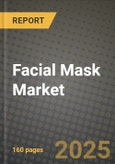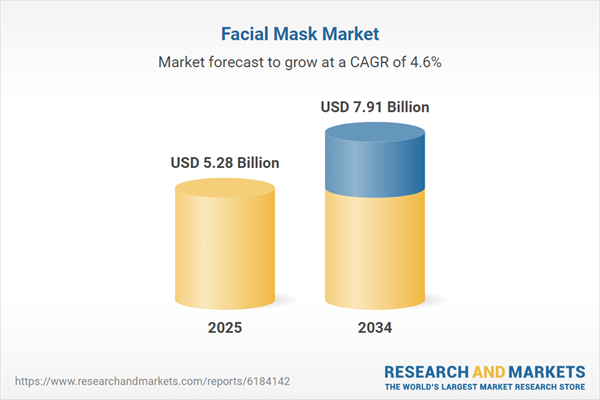Facial Mask Market
The facial mask market sits at the intersection of skincare science, wellness, and indulgent self-care. It spans sheet, hydrogel, bio-cellulose, clay/cream, peel-off, overnight “sleeping” masks, and emerging device-assisted formats (e.g., LED masks paired with topical boosters). Top applications include deep hydration and barrier repair, brightening and tone correction, acne and oil control, anti-aging/firming, post-procedure soothing in clinical/derma settings, and express “instant glow” treatments for events and travel. Current trends are anchored in dermacosmetic positioning (dermatologist-tested, fragrance-free), microbiome-friendly and sensitive-skin claims, biotech actives (peptides, ectoin, probiotics), and K-beauty/J-beauty inspired layering. Growth is fueled by social commerce and influencer routines, expanding men’s and teen segments, premiumization via multi-step kits, and at-home spa habits that persisted beyond pandemic peaks. The competitive landscape is fragmented: global beauty houses and pharmacy dermabrands compete with agile indie labels and powerful Asian OEM/ODM manufacturers that accelerate speed-to-market and private label proliferation. Sustainability and compliance are reshaping product design - biodegradable nonwovens, reduced-plastic or mono-material sachets, waterless/dry masks, and transparency on ingredient sourcing. Digital discovery dominates; marketplaces and D2C remain pivotal while dermatology clinics, specialty retail, and chemists/pharmacies underpin credibility and trial. Barriers include regulatory scrutiny on claims, potential “mask fatigue” from single-use waste, and price sensitivity in mass channels. Yet innovation in substrates, sensorial delivery, and evidence-backed actives keeps the category vibrant, with opportunities in hybrid mask-plus devices, localized “zoning” solutions, and refill systems that align efficacy with eco-design.Facial Mask Market Key Insights
- Format evolution & substrates. Historic dominance of cotton sheet masks has shifted toward bio-cellulose and hydrogels for better occlusion and serum loading. Waterless/dry masks and rubberized “ampoule-locking” formats add sensorial payoff, while biodegradable fibers and lyocell address disposal concerns without sacrificing performance.
- Actives & dermacosmetic credibility. Ingredient stories moved from botanicals to science-first portfolios: hyaluronic acid blends, niacinamide, vitamin C derivatives, peptides, PHA/AHA/BHA in controlled delivery, and retinol alternatives like bakuchiol. Clinically substantiated claims, dermatologist partnerships, and irritation-mitigation (ceramides, ectoin, centella) drive trust and repeat use.
- Targeted solutions & skin cycling. Consumers segment by need - barrier repair, oil control, anti-blemish, tone/texture, firming - using masks as “boosters” in weekly skin cycling. Multi-zone kits (T-zone vs. U-zone) and eye/lip/neck masks expand basket size and address overlooked areas.
- Post-procedure and clinic crossover. Masks designed for post-laser/peel downtime (soothing, cooling, sterile packaging) migrate from clinics to retail, bridging professional and OTC dermacosmetic channels and encouraging regimen bundling with SPF and barrier serums.
- Device integration & LED synergy. Home-use LED masks and microcurrent tools create premium bundles with mask ampoules tuned to light wavelengths or electrical currents. This raises average selling prices and anchors subscription models for consumable mask refills.
- Sustainability as design constraint. Regulators and retailers push reduced single-use plastics, FSC/mono-material sachets, and compostable sheets. Brands respond with concentrated essences, refill pods, and LCA-driven packaging - turning eco-proof points into purchase drivers.
- Channel shifts & social commerce. Discovery and conversion tilt toward short-video tutorials, livestreaming, and creator collabs. Subscription kits and limited-drop scents/textures keep engagement high, while pharmacies and derm chains provide authority and introduce older cohorts.
- Price tiers & premiumization. Mass retains scale with value multipacks and private label, but growth concentrates in masstige/premium via biotech actives, metal-cooling applicators, and spa-grade sensorials. Travel minis and single-dose pouches support trial; refill jars suit loyalists.
- Men’s and Gen Z onboarding. Oil-control, anti-pollution, and post-shave soothing masks resonate with men, while Gen Z favors instant results, vegan/cruelty-free cues, and playful textures (bubble/peel gels) without fragrance or comedogenic risks - expanding total addressable demand.
- Supply chain & OEM/ODM agility. Asian OEMs compress concept-to-launch timelines and offer turnkey clinicals and compliant dossiers. Private label for retailers and beauty platforms intensifies price competition but also speeds diffusion of novel substrates and textures globally.
Facial Mask Market Reginal Analysis
North America
Demand skews to dermacosmetic, fragrance-free, and sensitive-skin claims, with pharmacies and dermatology practices reinforcing trust. Influencer-led routines and LED bundles uplift premium sets, while retailers emphasize clean-label standards and packaging recyclability. Ingredient transparency and allergy-safe formulations matter, and clinical before-after proof underpins conversion. Private label grows through big-box and drugstore chains, but indie prestige brands win via data-backed actives and inclusive shade/skin-type positioning.Europe
Regulatory rigor and retailer “free-from” lists shape formulations; microplastics scrutiny encourages biodegradable sheets and mono-material Sachets. Pharmacy-derma brands hold sway, especially in France, Germany, and the Nordics, where sustainability narratives and eco-design are table stakes. Spa/wellness tourism supports premium hydrogel and thermal-water masks. Southern markets adopt brightening and after-sun soothing SKUs, while e-commerce plus specialty chains drive discovery alongside strict claim substantiation.Asia-Pacific
Category epicenter with strong K-beauty/J-beauty influence, rapid format innovation, and powerful OEM/ODM ecosystems in Korea, Japan, and China. High routine adoption (multi-step regimens) sustains sheet and sleeping masks; whitening/brightening, anti-pollution, and hydration dominate. Social commerce and festival promos accelerate velocity, while domestic giants and cross-border D2C expand regionally. Sustainability shifts toward lyocell/bio-cellulose substrates and concentrated serums; men’s grooming and teen entry lines add incremental growth.Middle East & Africa
Premiumization led by beauty specialty retail and travel retail, with demand for hydration, after-sun soothing, and brightening aligned to climate and skin concerns. Halal-compliant, alcohol-free, and fragrance-controlled claims grow relevance. Luxury and masstige imports dominate, supported by influencer culture and mall-centric shopping. Emerging local brands leverage contract manufacturing hubs in Asia and Europe; e-commerce and pharmacy chains broaden access beyond tier-one cities.South & Central America
Consumers prioritize value-rich masstige with sensorial appeal - clay/cream masks and brightening/hydration sheets. Dermatologist endorsements and pharmacy channels are influential, especially for acne-control and post-procedure soothing. Local manufacturing partners support cost competitiveness, while cross-border marketplace sales introduce Asian innovations. Economic volatility favors private label multipacks; sustainability messaging is rising, with interest in natural actives (açai, yerba mate) and recyclable/mono-material packaging.Facial Mask Market Segmentation
By Type
- Sheet Mask
- Clay Mask
- Peel-off Mask
- Gel Mask
By Distribution Channel
- Supermarkets/Hypermarkets
- Specialty Stores
- Online Retail Stores
- Others
Key Market players
L’Oréal S.A., The Estée Lauder Companies Inc., Unilever PLC, Procter & Gamble Co., Shiseido Company Ltd., Johnson & Johnson Services Inc., Amorepacific Corporation, Beiersdorf AG, Kose Corporation, Natura & Co, Sisley SAS, Colgate‑Palmolive Company, Coty Inc., Avon Products Inc., Himalaya Wellness CompanyFacial Mask Market Analytics
The report employs rigorous tools, including Porter’s Five Forces, value chain mapping, and scenario-based modelling, to assess supply-demand dynamics. Cross-sector influences from parent, derived, and substitute markets are evaluated to identify risks and opportunities. Trade and pricing analytics provide an up-to-date view of international flows, including leading exporters, importers, and regional price trends.Macroeconomic indicators, policy frameworks such as carbon pricing and energy security strategies, and evolving consumer behaviour are considered in forecasting scenarios. Recent deal flows, partnerships, and technology innovations are incorporated to assess their impact on future market performance.
Facial Mask Market Competitive Intelligence
The competitive landscape is mapped through proprietary frameworks, profiling leading companies with details on business models, product portfolios, financial performance, and strategic initiatives. Key developments such as mergers & acquisitions, technology collaborations, investment inflows, and regional expansions are analyzed for their competitive impact. The report also identifies emerging players and innovative startups contributing to market disruption.Regional insights highlight the most promising investment destinations, regulatory landscapes, and evolving partnerships across energy and industrial corridors.
Countries Covered
- North America - Facial Mask market data and outlook to 2034
- United States
- Canada
- Mexico
- Europe - Facial Mask market data and outlook to 2034
- Germany
- United Kingdom
- France
- Italy
- Spain
- BeNeLux
- Russia
- Sweden
- Asia-Pacific - Facial Mask market data and outlook to 2034
- China
- Japan
- India
- South Korea
- Australia
- Indonesia
- Malaysia
- Vietnam
- Middle East and Africa - Facial Mask market data and outlook to 2034
- Saudi Arabia
- South Africa
- Iran
- UAE
- Egypt
- South and Central America - Facial Mask market data and outlook to 2034
- Brazil
- Argentina
- Chile
- Peru
Research Methodology
This study combines primary inputs from industry experts across the Facial Mask value chain with secondary data from associations, government publications, trade databases, and company disclosures. Proprietary modeling techniques, including data triangulation, statistical correlation, and scenario planning, are applied to deliver reliable market sizing and forecasting.Key Questions Addressed
- What is the current and forecast market size of the Facial Mask industry at global, regional, and country levels?
- Which types, applications, and technologies present the highest growth potential?
- How are supply chains adapting to geopolitical and economic shocks?
- What role do policy frameworks, trade flows, and sustainability targets play in shaping demand?
- Who are the leading players, and how are their strategies evolving in the face of global uncertainty?
- Which regional “hotspots” and customer segments will outpace the market, and what go-to-market and partnership models best support entry and expansion?
- Where are the most investable opportunities - across technology roadmaps, sustainability-linked innovation, and M&A - and what is the best segment to invest over the next 3-5 years?
Your Key Takeaways from the Facial Mask Market Report
- Global Facial Mask market size and growth projections (CAGR), 2024-2034
- Impact of Russia-Ukraine, Israel-Palestine, and Hamas conflicts on Facial Mask trade, costs, and supply chains
- Facial Mask market size, share, and outlook across 5 regions and 27 countries, 2023-2034
- Facial Mask market size, CAGR, and market share of key products, applications, and end-user verticals, 2023-2034
- Short- and long-term Facial Mask market trends, drivers, restraints, and opportunities
- Porter’s Five Forces analysis, technological developments, and Facial Mask supply chain analysis
- Facial Mask trade analysis, Facial Mask market price analysis, and Facial Mask supply/demand dynamics
- Profiles of 5 leading companies - overview, key strategies, financials, and products
- Latest Facial Mask market news and developments
Additional Support
With the purchase of this report, you will receive:- An updated PDF report and an MS Excel data workbook containing all market tables and figures for easy analysis.
- 7-day post-sale analyst support for clarifications and in-scope supplementary data, ensuring the deliverable aligns precisely with your requirements.
- Complimentary report update to incorporate the latest available data and the impact of recent market developments.
This product will be delivered within 1-3 business days.
Table of Contents
Companies Mentioned
- L’Oréal S.A.
- The Estée Lauder Companies Inc.
- Unilever PLC
- Procter & Gamble Co.
- Shiseido Company Ltd.
- Johnson & Johnson Services Inc.
- Amorepacific Corporation
- Beiersdorf AG
- Kose Corporation
- Natura & Co
- Sisley SAS
- Colgate-Palmolive Company
- Coty Inc.
- Avon Products Inc.
- Himalaya Wellness Company
Table Information
| Report Attribute | Details |
|---|---|
| No. of Pages | 160 |
| Published | November 2025 |
| Forecast Period | 2025 - 2034 |
| Estimated Market Value ( USD | $ 5.28 Billion |
| Forecasted Market Value ( USD | $ 7.91 Billion |
| Compound Annual Growth Rate | 4.6% |
| Regions Covered | Global |
| No. of Companies Mentioned | 15 |









